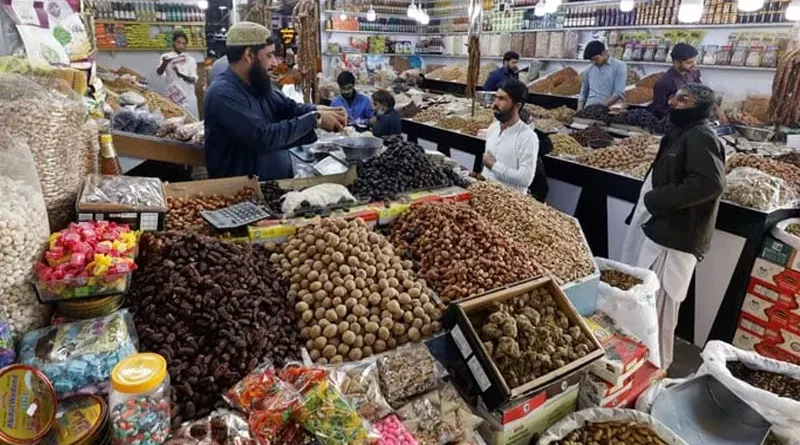No relief for masses as inflation hits 29.6% in Dec 2023
ISLAMABAD: The lower and middle-income groups in Pakistan continue to suffer as the monthly inflation surges to 29.66% in December 2023 due to the elevated food and energy costs, The News reported Tuesday.
The inflation rate increased by 0.46% from the previous month. However, core inflation, excluding food and energy costs, reached a 10-month low at 18.2%.
This downtick may prompt State Bank of Pakistan (SBP) policymakers to consider easing the discount rate next month to stimulate economic activities and growth.
The increase in headline inflation measured by the consumer price index (CPI), is attributed to high food and energy prices, deviating from the government’s earlier forecast of 25.5 to 26.5% in early December.
In November, inflation saw a 0.8% uptick, compared to a 2.7% increase the previous month and 0.5% in December 2022.
Notably, earlier in November CPI surged to 29.2% from October’s 26.9%, primarily due to a significant gas tariff hike. In December, it rose further to 29.66%, driven mainly by an increase in electricity costs, notably positive monthly fuel price adjustments (FCA).
The spike in housing and utility costs, rising 37.68% from November’s 32.97%, is a key factor, with this category carrying nearly one-fourth of the weightage in the CPI basket. On a month-to-month basis, these items became 3.56% costlier than the previous month.
For the first half of the fiscal year (July-Dec 2023-24), average inflation stood at 28.8%, exceeding the government’s target of 21% and the SBP’s range of 20 to 22%.
Food inflation in December YoY was 27.5%, slightly lower than the previous month’s 27.95%, but on a month-to-month basis, it decreased by 0.49%.
Alcoholic beverages and tobacco maintained an inflation rate of 82.8%, increasing by 0.5% over November.
Recreation and culture costs decreased to 38.48%, lower than the 53.56% recorded in November. Communication charges YoY was 7.4% in December and the same was in the previous month. Education is also at 13.5% almost unchanged on a YoY basis, and on an MoM basis, it increased by 0.23%.
Transport expenses increased to 28.6% from 26.5% in the previous month. Over the previous month, the transportation charges were 0.8% costlier in December.
Hotel and restaurant charges in December were 30.7% higher than a year ago and in November it was 31.4%. Over the previous month, it was however higher by 0.72%.
Furnishings experienced an increase of 0.9% over the previous month while over the same month of last year, it was 32.5% expensive. Health expenses in a month increased by 0.7% and 23.36% in a year.
Core inflation, a key factor in policy rate decisions, has been on a monthly increase but declined on a YoY basis. In January 2023, it was 15.4%, with subsequent months recording fluctuations until reaching 18.2% in December. In other months i.e. February 2023 it was 17.1%, March 18.6%, April 19.5%, May 20% (which recorded high), June 18.5%, July and August at 18.4% each, September 18.6%, October 18.5%, and November at 18.6%.
The wholesale price index (WPI), a measure of producer prices, rose to 27.3% in December from 26.4% in November. The sensitive price indicator (SPI), which tracks the prices of essential items on a weekly basis, was recorded at 35.3% against 30.6% in November.
Urban inflation was at 30.9% and rural at 27.9%. In the previous month, urban inflation was at 30.4% and rural at 27.5%.
On a month-on-month basis, onions price increased by 30.8%, dry fruits 5.2%, masoor pulse 5.1%, eggs 4.7%, pan prepared 4.4%, gram pulse 3.7%, fish 3.2%, sugar 2.5%, wheat 2.2%, pulse moong 2%, mash pulse 1.2%, wheat flour 0.8%, powder milk 0.3% and meat 0.2%.
However, tomatoes price reduced 42pc, potatoes 18.6pc, tea 8.6%, chicken 4.2%, gur 3.5%, vegetable ghee 2.7%, rice 2.7%, fresh vegetables 2.2%, fresh fruits 1.65%, cooking oil 1.6%, condiments and spices 1.45%, whole gram 0.76%.
Among non-food items, on an MoM basis, electricity charges increased by 15.76%, transport services 12%, woollen readymade garments by 4.02%, solid fuel by 2.4%, construction input items by 0.67%, household equipment by 0.62%, dental services by 0.6%, construction wage rates 0.54%. However, motor fuel charges were reduced by 2.4% over the previous month.
On a year-on-year basis, fresh vegetable prices increased by 65.41%, wheat flour 59%, sugar 49%, potatoes 47%, rice 46%, mash pulse 44%, wheat products 39%, tea 38%, masoor pulse 32%, wheat 29%, eggs 27%, fresh milk 22%, tomatoes 21%, fish 20%, meat 17%, chicken 17%, moong pulse 13%, whole gram 12%, gram pulse 3.9%, fresh fruits 3.2% and cooking oil 2.6%.
However, onion prices were reduced by 17.7%, mustard oil by 4.2%, and vegetable ghee by 1.2%.
Likewise, among the non-food items, on a yearly basis, gas charges were up by 520%, electricity charges 61.6%, transport services 38.2%, drugs and medicines 32.4%, doctor (MBBS) clinic fees 25%, hospitals services 23.5%, motor fuel 22.5%, motor vehicles 22%, construction input items 20.3%, solid fuel 19.4%, dental services 11%, water supply 16%, medical tests 15%, tailoring 14.5%, construction wage rates 12.7%, education 12.7%, household servant 12.2%, postal services 11.5% and house rent increased by 5.6% over the same month of last year.

